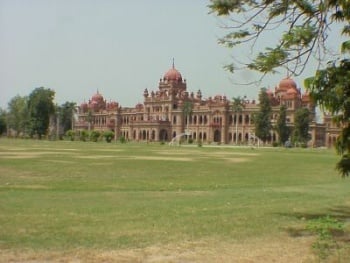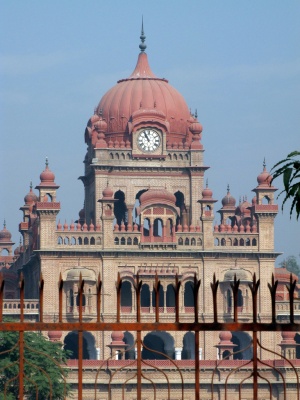Khalsa College: Difference between revisions
Hari singh (talk | contribs) |
Hari singh (talk | contribs) |
||
| Line 23: | Line 23: | ||
==The Building== | ==The Building== | ||
[[File:KhalsaCollegeAmritsar-2.jpg|thumb| | [[File:KhalsaCollegeAmritsar-2.jpg|thumb|300px|right|Photo showing details of a central dome at [[Khalsa College]], [[Amritsar]]]] | ||
The main building is considered a gem of the {{w|Indo-Sarcenic}} style, which is strongly influenced by traditional Indian and Mughal schools of architecture. The foundation stone was laid on March 5, 1892, with the first classes starting in 1893. | The main building is considered a gem of the {{w|Indo-Sarcenic}} style, which is strongly influenced by traditional Indian and Mughal schools of architecture. The foundation stone was laid on March 5, 1892, with the first classes starting in 1893. | ||
Revision as of 13:07, 29 April 2009
Guru Hargobind fought his first battle at the present day site of Khalsa College in 1634 and was victorious. The Guru was about to celebrate the marriage of his only daughter Bibi Viro when he was attack by the Mughals. A force of 700 Sikhs defeated an army of 7,000 Mughal troops. The foundation stone of Khalsa College was laid in 1892 and it has since been one of the eminent Sikh educational institutions.
Khalsa College is a historic educational institution in the northern Indian city of Amritsar in Punjab state. Founded in 1892, the sprawling 300-acre campus is located about eight km outside of the city center on the Amritsar-Lahore highway (part of the Grand Trunk Road), adjoining Guru Nanak Dev University campus, to which Khalsa College is academically affiliated.
Khalsa College has following faculties:
- Faculty of Humanities and Social Sciences
- Faculty of Commerce and Business Administration
- Faculty of Sciences
- College of Agriculture
- Institute of Computer Science
History
Khalsa College Establishment Committee was set up in 1890 with Colonel W. R. M. Holroyd, Director of Public Instruction, Punjab, as president, and W. Bell, Principal of Government College, Lahore, as secretary. Among the native constituents of this 121-member committee were Sir Attar Singh, Gurdial Singh Maan of Nabha, Diwan Gurmukh Singh of Patiala, Bhai Kahn Singh, Professor Gurmukh Singh and Sardar Jawahir Singh (1859-1910). Many princely states of British India gave their financial help to the establishment of Khalsa College, including Maharaja Rajendra Singh of Patiala, Maharaja Hira Singh of Nabha, Maharaja Jagatjit Singh of Kapurthala and Sir Sunder Singh Majithia.
After a prolonged discussion about the site of Khalsa College, it was decided that one college would be established in Amritsar, followed by a second in Lahore. The 300-acre campus was sited just outside the village of Kot Sayyad Mehmood, which was later renamed Kot Khalsa.
As an important milestone in 1930, a Sikh History Research Department(SHRD) was set up at the college in memory of Sardar Karam Singh Historian after his death who had been instrumental in his life time to bring such department.The department has rare coins and weapons of the 17th and the 18th centuries (mathlock, dhaal, Katar, chakkar, bows and kirpans).
The Building
The main building is considered a gem of the Indo-Sarcenic style, which is strongly influenced by traditional Indian and Mughal schools of architecture. The foundation stone was laid on March 5, 1892, with the first classes starting in 1893.
The college was designed by Bhai Ram Singh, principal of the Mayo School of Arts, Lahore, with the help of engineer Dharam Singh Gharjakhia. Bhai Ram Singh was decorated for his services with the Member of the Victorian Order (Royal Victorian Order), the highest civilian award of British India.
Professor Kishen Singh
The First Sikh Principal of Khalsa College Amritsar
Professor Kishen Singh was the first Sikh Principal of Khalsa College Amritsar, the pioneer Sikh institution in India. He was the eldest son of Bhai Kharak Singh who had migrated from Kabul, Afghanistan.
Professor Kishen Singh was a professor of Maths at the College and on 30th April 1898, when Mr Vere O’Ratigan, the then Principal, left the College, Professor Kishen Singh was called to officiate as Principal, thus becoming the first Sikh Principal of the College. He again took over the reins of Principal of the College on 15th August 1899 when Dr. John Cambell Oman left the College to sail to England.
The most startling event during his tenure as Principal was the visit of Lord Curzon, the then Viceroy and Governor General of India.
Twin design institute Aitchison school Lahore
Architecturally identical in design with Khalsa College Amritsar is Aitchison School Lahore designed by the same architect famous Bhai Ram Singh of then Mayo School of Arts, Lahore (now National college of Arts, Lahore)(To read the full story follow the external links)
Principals
Colonel W. R. M. Holroyd was first President of the Governing Council of the Khalsa College Amritsar.
- Dr Johan Campbell Oman (1898-1899)
- Kishen Singh Kapoor (1899-1900) First Sikh Principal
- M. G. V. Cole (1900-1910)
- R. G. Wright (1910-1915)
- G. A. Wathen (1915-1924)
- Bishan Singh (1928-1936),
- Jodh Singh (1936-1952)
Other principals of Khalsa College Amritsar include:
- Inder Singh (1952-1957)
- Harbant Singh (1958-1961)
- Balwant Singh Anand (1962-1963)
- Bishan Singh Samundri (1964-1969)
- Sham Singh Kapur (1970-1971)
- Harbans Singh (1971-1975)
- Gurbax Singh Shergill (1975-1989)
- Harbhajan Singh Soch (1989-1995)
- Mohinder Singh Dhillon (1996-2003)
- Daljeet Singh ( 2005-2008)
Famous visitors
- Mahatma Gandhi (1920)
- Edward, Prince of Wales, later Edward VIII of the United Kingdom (1921)
Famous alumni
The college has produced many prominent educationists, players, bureaucrats and defence personnel.
In hockey, Colonel Gurmeet Singh, Shahzada Khuram, Latif, Balbir Singh, Dharam Singh, Bakhshish Singh, Harbinder Singh, Ram Sarup Passi and Inder Singh have been the shining stars.
|
The college has produced many generals, including
|
Trivia
The outside court scenes featuring Shah Rukh Khan's character Veer in the film Veer-Zaara were filmed at the college. Being a favourite place of directors/producers, it has attracted many Punjabi as well as Hindi film-makers who have shot videos here.
See also


